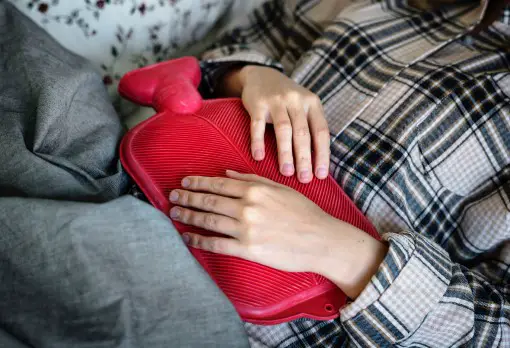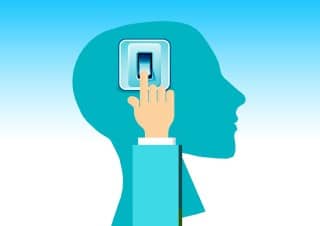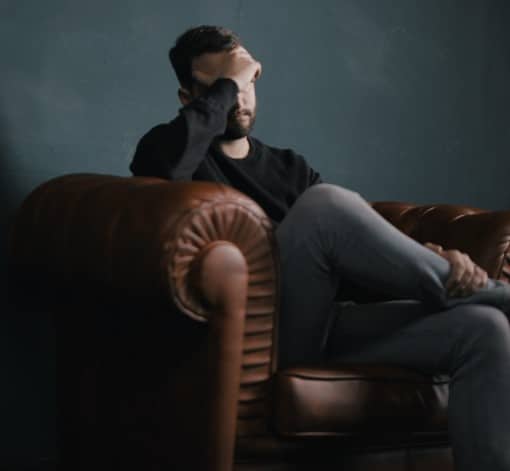
If you’re wondering if sleep will help your nausea, here’s why it might
By Jason Wooden, PhD
Will sleep help nausea? The short answer is maybe because there are many causes for feeling queasy, including stomach bugs, medications, motion sickness, heartburn, and pregnancy.
While sleep as a general remedy for nausea has not been well studied, ongoing insomnia can cause stress and anxiety which can trigger the body’s flight-fight response and nausea symptoms.
So, sleep may help nausea if insomnia is the cause, making it important to practice good sleep hygiene and underlying sleep disorders. You should also check for other health issues that can cause nausea symptoms.
Why we’re curious whether sleep will help nausea
You’re probably not the only one wondering whether sleep can help nausea, especially if you’re feeling over-tired.
Perhaps you’ve tried other things and you’re just wondering if getting more time in the sack will do the trick.
We’ve all had bouts of queasiness at one time and it can be pretty frustrating. In fact, every day millions of people deal with nausea.
There are many causes for nausea including pregnancy, motion sickness, heart burn, stomach bugs, medications, and many other medical conditions.
Given how much we’re learning about the central role that sleep plays in health, it’s natural to wonder what it could do for a queasy stomach.
Sleep is important for keeping your brain healthy and keeping your immune system in fighting form. Poor sleep has been linked to obesity, diabetes, dementia, and heart disease.
With 1 and 3 Americans waking up sleep deprived, there are bound to be people for which poor sleep may be involved with their nausea symptoms.
So, let’s take a serious look at what we know and what you can do.

What do we know about how sleep can help nausea?
Have you ever gotten that over-tired sick feeling in your stomach and wondered whether catching up on sleep can help your nausea?
Maybe you were jet lagged, worked swing shift, or just had a week of bad sleep.
It’s natural to be curious about the connection between sleep and nausea.
Okay, let’s be clear – sleep as a general remedy for nausea has not been well studied.
However, there may be a connection.
We’ve all experienced butterflies in the stomach during a first date or a bit of queasiness at a job interview.
So, what’s going on when this happens?
Your gut has its own nervous systems with over a 100 million neurons. That makes for all sorts of interesting interactions between the brain and digestive tract, known as the brain-gut axis.
Because of the brain-gut axis, stress and anxiety can have psychological and physical symptoms, including bouts of nausea.
Stress is the body’s emergency system to respond to perceived threats, whether physical or mental.
It triggers the body’s “flight or fight” response and the release of powerful stress hormones to help you deal with an emergency.
Anxiety is one of the ways the body reacts to stress.
Too much stress and anxiety for too long can actually harm the body. It can lead to more sensitivity to pain and issues in the gut such as nausea.
Here’s where things get interesting…
It turns out there’s a strong link between sleep, stress, and anxiety. Poor sleep can cause stress while ongoing insomnia can increase your risk for anxiety.
Because of this link, getting better sleep may help your nausea if insomnia is either causing or worsening your symptoms.
And similar to fighting a cold or the flu, getting adequate rest can help your body recover.

If sleep can help my nausea symptoms, what can I do to sleep better?
If you’re fighting insomnia on an ongoing basis you need to start taking your sleep way more seriously.
Getting better sleep can help with nausea and help prevent many of the other health issues linked to insomnia that can make a rough situation worse.
It’s also a good idea to do something sooner than later so you don’t get stuck in a downward spiral where stress and anxiety makes it harder to fall asleep.
Start practicing good sleep hygiene.
This is what you do during the day, evening, and at bedtime that can set the stage for good sleep quality. It involves things such as when you nap, avoiding stimulants, and your bed room environment.
You should also get help from a sleep specialist as there may be other health issues causing problems for your sleep. It could be asthma, diabetes, chronic pain, or an underlying sleep disorder such as sleep apnea.
Even with the world’s best sleep hygiene, underlying health issues can sabotage your sleep.
Need some ideas for changes you can make? Try this sleep checklist.
Sleep Hygiene Tips
- Keep consistent wake up and sleep times
- Avoid naps
- Exercise during the day
- Avoid large meals, alcohol, or stimulants such as caffeine before bedtime
- Maintain a regular bedtime routine
- Avoid using electronics before sleep (TVs, tablets, smart phones)
- Keep your bedroom dark, cool, quiet, and relaxing

What’s the best sleeping position for nausea?
We’ve talked at length about what to do to get better sleep to help your nausea.
Don’t overlook the importance of HOW you sleep.
Your sleep position can make a big difference, especially if you’re dealing with ongoing medical issues that make getting quality sleep extra challenging.
Your options include sleeping on your back, side, or stomach. (I won’t mention all the variations in between.)
Your specific health issues will determine the best sleeping position for your nausea.
Pain
Lingering pain can make it harder to fall asleep and stay sleep. Currently 1 in 4 Americans deal with pain at night. Depending on the source of pain, you may have to experiment to find the most comfortable position.
Sleeping positions for back pain
Sleeping positions for neck pain
Sleep apnea and snoring
Obstructive sleep apnea causes airways to collapse during sleep which interrupts breathing and your normal sleep cycles. The result is that you wake up feeling unrested. It’s often accompanied by snoring and currently affects over 18 million adults in the US alone.
You may want to try sleeping on your side or stomach to help keep your airways more open. Recent research suggests that sleeping upright with your body slightly elevated may also help.
Heartburn
Stomach acid backing up into the esophagus can cause a painful burning feeling in your throat or chest. It’s also a source of nausea. More than 60 million Americans get heartburn at least once a month.
Studies have found that sleeping on the right side can aggravate it. Experts recommend that you sleep on your left side or with your body elevated slightly from the waist up.
Pregnancy
Morning sickness is a common cause for nausea. Experts suggest that you try sleeping on your side for more comfort.
Finally, don’t forget about your bed and pillows. If they’re old, be sure to replace them for better head, back, and body support.

What can I do if nausea is keeping me from falling asleep?
Sleep hygiene, check.
Mattress and bed, check.
Stomach…no go.
It’s a tough spot to be in – you desperately want to get sleep to help your nausea, but your queasy stomach keeps you awake and miserable.
So, what can you do when nausea is keeping you from falling asleep?
Here are some things to try:
Eat long before bedtime – Eating just before you lay down can increase your chances for nausea.
Avoid greasy, fatty, spicy, and sugary foods – While flavorful, these foods can trigger heartburn and acid reflux.
Stay hydrated – Experts say that drinking lots of water can help with nausea. One potential downside to watch out for is if hydrating during the evenings keep you up at bedtime going to the bathroom.
Avoid strong smells – Stay away from any smells you know can trigger your nausea.
Open a window – For some, stuffy air in the bedroom can trigger nausea.
Try a bland snack – You may find that a simple snack such as plain crackers may help settle your stomach.
Tea – Some find ginger or peppermint tea helpful for nausea. Learn more
Carbonated beverages – Some people find ginger ale or other flavored-carbonated beverages soothing for an upset stomach.
Aromatherapy oils – Lavender and peppermint oils well known for their calming and anti-nausea effects. Learn more
Try a bland diet – A diet that includes foods which are soft, not very spicy, and low in fiber may be healthful nausea. Learn more
Anti-nausea medicine – There are over-the-counter options which are mainly recommended for mild nausea. A doctor can prescribe stronger meds such Prochlorperazine and Metoclopramide. You should be aware that nausea meds can cause drowsiness. Learn more
Some over-the-counter nausea meds…




What else can I do for my nausea?
Sleep can help nausea, but sleep by itself won’t deal with some of the other root causes.
Be sure to see a doctor, especially if your nausea is ongoing.
As I mentioned earlier, there are many different things that can make you feel queasy. A doctor can check for other underlying health issues.
There may be something more serious going on.
Maybe you have undiagnosed acid reflux or diabetes.
A doctor can also make adjustments to any meds you’re taking that may be causing problems. (Yes, it’s quite common and quite a few meds. You can read about it here.)
Even if poor sleep is worsening your symptoms, play it safe and make sure you’re doing everything you can do to get rid of your nausea.
Medical conditions linked to nausea:
- Food allergies
- Food poisoning
- Digestive tract infections
- GERD (acid reflux)
- Migraine headaches
- Morning sickness
- Seasickness or motion sickness
- Severe pain
- Ulcers
Source: US National Library of Medicine
Will sleep help nausea? – 4 things to remember:
- Insomnia can trigger stress and anxiety which can cause or worsen nausea
- Sleep can help with nausea if insomnia is the cause
- Practice good sleep hygiene and see a sleep specialist
- Be sure to check with a doctor for other health issues that may be involved with your nausea
Sources:
1. Think Twice: How the Gut’s “Second Brain” Influences Mood and Well-Being, 2010, Scientificamerican.com
2. The gut-brain connection, Harvard Health Publishing website
3. Understanding the stress response, Harvard Health Publishing website
4. Sleep and Mood, Harvard Health Publishing website
5. Pain Management, NIH website
6. Acid Reflux, American College of Gastroenterology website
7. Are lifestyle measures effective in patients with gastroesophageal reflux disease? An evidence-based approach, Arch Intern Med. 2006; 166(9):965-71.
8. Ease Heartburn at Bedtime, National Sleep Foundation website
Connect with us:
About Us
Better Sleep Simplified® was founded as a place for you to get clear and well-researched information.
Our goal is to make sure you know about your options so that you take action sooner rather than later.
Check us out on YouTube:
Watch and Learn
Helpful sleep tips, interesting sleep facts and statistics you want to know about
Affiliate Disclosure
This site is a participant in the Amazon Services LLC Associates Program and other affiliate advertising programs designed to provide a means for sites to earn advertising fees by advertising and linking to them.
Important: BetterSleepSimplified.com is for informational purposes only and is not intended or implied to be a substitute for professional medical advice, diagnosis, or treatment. Always consult a physician for sleep and health concerns. See additional information.
